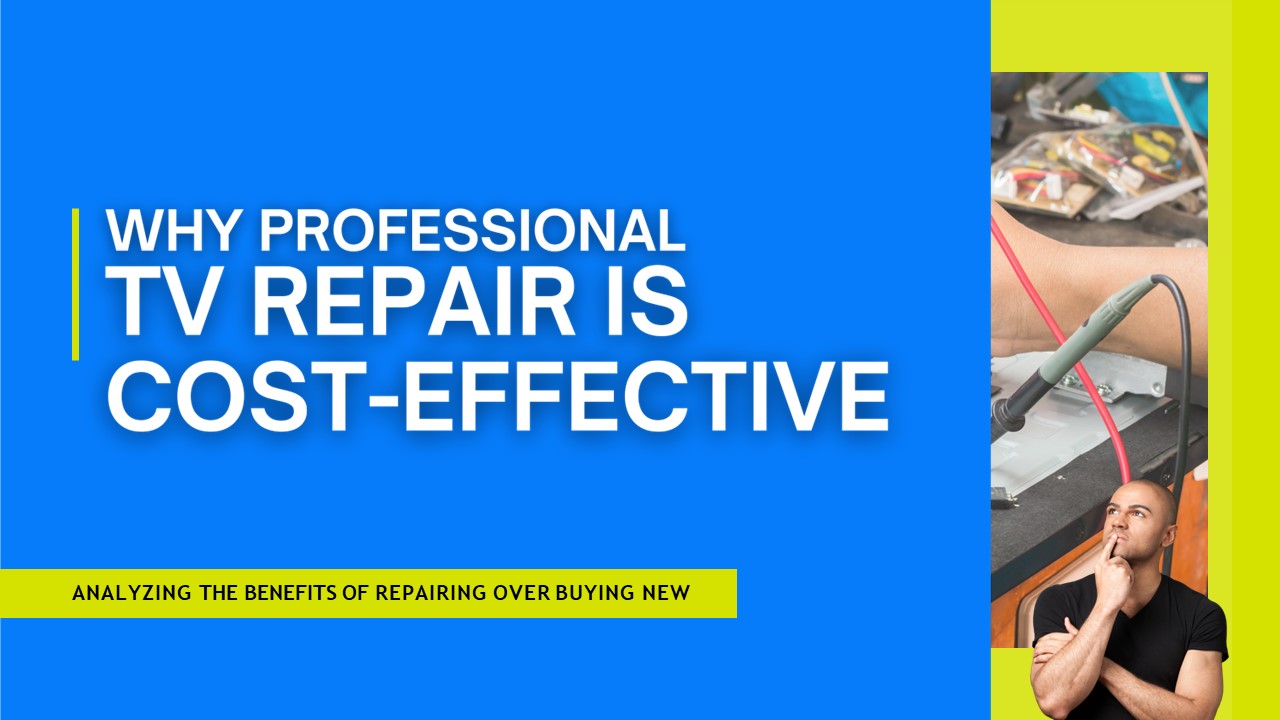Why Professional TV Repair is Cost-Effective - PowerPoint PPT Presentation
Title:
Why Professional TV Repair is Cost-Effective
Description:
Looking for reliable TV repair in Markham? Our expert technicians offer top-notch repair services for all major TV brands and models. With years of experience and a commitment to quality, we ensure your television is restored to perfect working condition. We provide fast, efficient service at competitive prices, backed by warranties for peace of mind. Trust us for all your TV repair needs in Markham and enjoy clear, uninterrupted viewing again. Contact us today! – PowerPoint PPT presentation
Number of Views:0
Title: Why Professional TV Repair is Cost-Effective
1
ANALYZING THE BENEFITS OF REPAIRING OVER BUYING
NEW
2
INTRODUCTION
In this presentation, we explore the financial
and practical advantages of professional TV
repair over purchasing new models. We will
examine the initial and ongoing costs associated
with new TVs, discuss their rapid depreciation,
and contrast these expenses with the typical
costs of repairing common TV issues. Our analysis
aims to demonstrate how repairing your existing
TV can significantly extend its lifespan and
prove to be a cost-effective alternative to
buying new.
3
THE COST OF
BUYING A NEW TV
Buying a new TV is appealing but expensive. A
mid-range 4K TV costs 400 to 1,000, plus hidden
costs like old TV disposal, installation, and
possibly new hardware or subscriptions.
4
DEPRECIATION
OF TV VALUE
New televisions depreciate rapidly, losing as
much as 20 of their value within the first year
and more in subsequent years. This slide features
a graph showing the steep decline in value of a
new TV over the first two years compared to the
relatively minor investment in repairing an
existing one.
5
AVERAGE COSTS OF
COMMON REPAIRS
Common TV issues include screen malfunctions,
audio problems, and connectivity issues, with
repairs typically ranging from 100 to 300. When
compared to the cost of new TVs, these repair
costs are significantly lower, making repair a
financially sensible option in many cases.
6
Quality repairs can extend the life of a TV
significantly. For example, replacing a faulty
backlight might add several years to a TV's
operational lifespan. We include real-life case
studies where specific repairs have extended the
life of televisions, demonstrating the value of
skilled repair work.
7
ENVIRONMENTAL
Choosing to repair rather than replace your TV
plays a crucial role in reducing electronic
waste. Each repaired TV is one less unit
contributing to the growing problem of e-waste.
This choice not only saves money but also
supports environmental sustainability.
IMPACT
8
WARRANTY
AND SUPPORT
- Professional repairs often come with warranties
that provide peace of mind and support. These
warranties cover future malfunctions and ensure
ongoing performance, adding value well beyond the
initial - repair.
9
WHEN TO REPAIR VS WHEN TO REPLACE
This slide provides guidelines to help you decide
whether to repair or replace a TV. Factors
include the cost of repair versus replacement,
the age of the TV, and whether the technology
meets current standards. We also discuss how to
conduct a simple cost-benefit analysis to make
informed decisions.
10
CONCLUSION
To conclude, repairing your TV is not only
cost-effective but also environmentally friendly
and supported by warranties that extend its
usefulness. We encourage you to consider
professional TV repair services as a viable
alternative to replacement.































